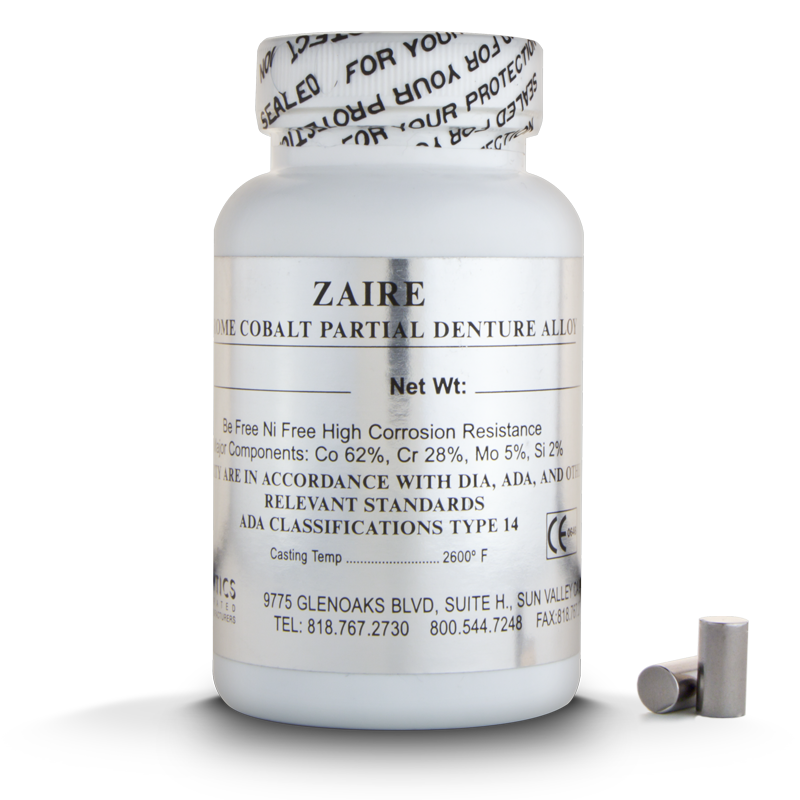
Physical Data
| Melting Range | 1320°c-1380°C (2408°F-2516°F) | Casting Temp | 1454°C (2650°F) |
|---|---|---|---|
| Hardness | 330 HV | CTE | - |
| Yield Strength | 96,000 PSI | Tensile Strength | 108,000 PSI |
| Elongation | 6% | Density | 8,70 g/cm3 |
| Specific Gravity | 8,40 g/cm3 |
Section I
Material Identification
Chrome-Cobalt Base Partial Denture AlloyTrade Name
None-Precious AlloyCommercial Name
ZaireSection II
Ingredients & Hazards
| Ingredients | Cas # | % Composition by weight |
|---|---|---|
| Cobalt (Co) | (7440-48-4) | 60-62% |
| Chromium (Cr) | (7440-47-3) | 28-30% |
| Molybdenum (Mo) | (7439-98-7) | 5-6% |
| Silicon (Si) | (7440-21-3) | <1% |
| Manganese (Mn) | (7439-96-5) | 1% |
| Iron (Fe) | (7439-89-6) | <1% |
| Carbon (C) | (7440-44-0) | 0.30-0.40%* |
Solid Form
- Fire and explosion resistant
- Insoluble in water
- No odor
- Non-toxic
- In solid form no special precautions are required
Hazard Data
- Chromium
- Eight (8) hr. Tlv – 5 mg/m3
- Molybdenum
- Eight (8) hr. Tlv – 1 mg/m3
- Silicon
- Twa – 10 mg/m3
Technical Data
| Melting Range | 1320° – 1380° C (2408° - 2516° F) |
| Yield Strength | 96,000 PSI |
| Tensile Strength | 108,000 PSI |
| Elongation | 6% |
| Density | 8.70 (g/cm³) |
Casting and Grinding
During casting and grinding avoid inhalation of fumes and dust. Exposure to large concentrations of dust may cause industrial dermatitis and respiratory tract irritation. Chronic exposure to Cobalt may cause pulmonary hypersensitivity.
Wear protective clothing. Melt, grind and polish in presence of adequate ventilation. Use respirator, goggles, gloves, coveralls, or protective clothing.
Although reasonable care has been taken in gathering information from the sources which we believe are reliable for preparation of this documents, we extend no warranties and make no representation as to the accuracy or completeness of the information contained, and assume no responsibility regarding suitability of this information for the user's intended purpose or for the consequences of its use.
PROCESSING TECHNIQUE
Use investments for high-heat Chromium-Cobalt partial denture alloys only. Burnout at the temperatures and time recommended by the investment manufacturer or at a minimum of 1,850°F (1,010°C) for 1.5 hrs.TORCH CASTING
- Use a single-orfice tip or a multi-orfice tip.
- Set gauge at 20 psi oxygen and 8 psi acetylene.
- Give the spring-type casting arm three turns on an average casting.
- Place a sufficient amount of alloy in the preheated crucible.
- Heat the alloy evenly until the alloy begins to melt. At this point, drop a small amount of flux onto the heated metal to make the piece flow together. When the metal melts into a single mass, release the casting machine arm.
- Allow the casting arm to rotate for a minimum of twenty seconds. Then remove the mold and set it aside to bench cool.
INDUCTION CASTING
It is crucial to follow the manufacturer's instructions in the operation of your specific equipment, due to the various types of induction machines available on the market (such as Manual, Semi-Automatic, and Fully Automatic, etc.). Exercise care in placing virgin metals or buttons in the crucible. Do not drop in ingots. Instead, use large tweezers to load the crucible, which will help prevent cracking of the crucible. For manual operators, when all the metal has melted together as one joined mass, release machine immediately to prevent overheating of the metal.FINISHING STEPS
*Cut the sprues*Trim remaining metal from sprues
*Clean up the inside of clasps and uprights with Taper Stone
*Grind or trim tight areas with an Inverted Cone
*Go over the entire case with a Small Barrel for polishing
*Sandblast and prepare for polishing
